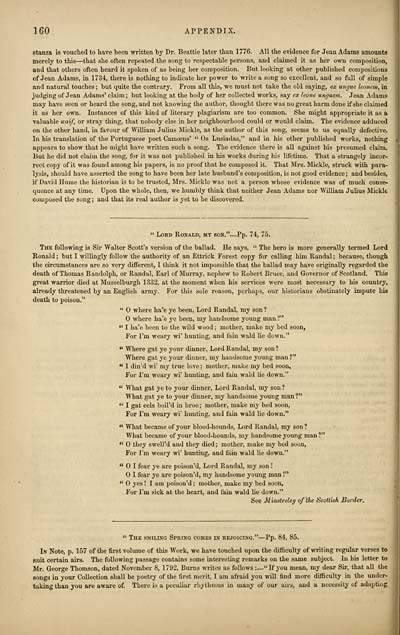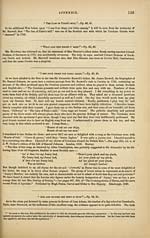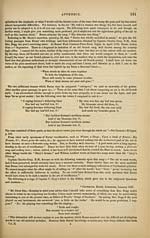Inglis Collection of printed music > Printed music > Songs of Scotland adapted to their appropriate melodies > Volume 2
(172) Page 160
Download files
Complete book:
Individual page:
Thumbnail gallery: Grid view | List view

160 APPENDIX.
stanza is vouched to have been written by Dr. Beattie later than 1776. All the evidence for Jean Adams amounts
merely to this — that she often repeated the song to respectable persons, and claimed it as her own composition,
and that others often heard it spoken of as being her composition. But looking at other published compositions
of Jean Adams, in 1734, there is nothing to indicate her power to write a song so excellent, and so full of simple
and natural touches ; but quite the contrary. From all this, we must not take the old saying, ex unyue leonem, in
judging of Jean Adams' claim ; but looking at the body of her collected works, say ex hone u nguem, Jean Adams
may have seen or heard the song, and not knowing the author, thought there was no great harm done if she claimed
it as her own. Instances of this kind of literary plagiarism are too common. She might appropriate it as a
valuable waif, or stray thing, that nobody else in her neighbourhood could or would claim. The evidence adduced
on the other hand, in favour of William Julius Mickle, as the author of this song, seems to us equally defective.
In his translation of the Portuguese poet Camoens' " Os Lusiadas," and in his other published works, nothing
appears to show that he might have written such a song. The evidence there is all against his presumed claim.
But he did not claim the song, for it was not published in his works during his lifetime. That a strangely incor-
rect copy of it was found among his papers, is no proof that he composed it. That Mrs. Mickle, struck with para-
lysis, should have asserted the song to have been her late husband's composition, is not good evidence ; and besides,
if David Hume the historian is to be trusted, Mrs. Mickle was not a person whose evidence was of much conse-
quence at any time. Upon the whole, then, we humbly think that neither Jean Adams nor William Julius Mickle
composed the song ; and that its real author is yet to be discovered.
" Lord Ronald, my son." — Pp. 74, 75.
The following is Sir Walter Scott's version of the ballad. He says, " The hero is more generally termed Lord
Ronald ; but I willingly follow the authority of an Ettrick Forest copy for calling him Randal ; because, though
the circumstances are so very different, I think it not impossible that the ballad may have originally regarded the
death of Thomas Randolph, or Randal, Earl of Murray, nephew to Robert Bruce, and Governor of Scotland. This
great warrior died at Musselburgh 1332, at the moment when his services were most necessary to his country,
already threatened by an English army. For this sole reason, perhaps, our historians obstinately impute his
death to poison."
" where ha'e ye been, Lord Randal, my son ?
where ha'e ye been, my handsome young man ?"
" I ha'e been to the wild wood ; mother, make my bed soon,
For I'm weary wi' hunting, and fain wald lie down."
" Where gat ye your dinner, Lord Randal, my son?
Where gat ye your dinner, my handsome young man?"
" I din'd wi' my true love; mother, make my bed soon.
For I'm weary wi' hunting, and fain wald lie down."
" What gat ye to your dinner, Lord Randal, my son ?
What gat ye to your dinner, my handsome young man ?"
" I gat eels boil'd in broo ; mother, make my bed soon,
For I'm weary wi' hunting, and fain wald lie down."
" What became of your blood-hounds, Lord Randal, my son?
What became of your blood-hounds, my handsome young man?"
" they swell'd and they died ; mother, make my bed soon,
For I'm weary wi' hunting, and fain wald lie down."
"01 fear ye are poison'd, Lord Randal, my son !
I fear ye are poison'd, my handsome young man !"
" yes ! I am poison'd ; mother, make my bed soon,
For I'm sick at the heart, and Jain wald he down."
See Minstrelsy of the Scottish Border.
" The smiling Spring comes in rejoicing." — Pp. 84, 85.
In Note, p. 157 of the first volume of this Work, we have touched upon the difficulty of writing regular verses to
suit certain airs. The following passage contains some interesting remarks on the same subject. In his letter to
Mr. George Thomson, dated November 8, 1792, Burns writes as follows: — "If you mean, my dear Sir, that all the
songs in your Collection shall be poetry of the first merit, I am afraid you will find more difficulty in the under-
taking than you are aware of. There is a peculiar rhythnius in many of our airs, and a necessity of adapting
stanza is vouched to have been written by Dr. Beattie later than 1776. All the evidence for Jean Adams amounts
merely to this — that she often repeated the song to respectable persons, and claimed it as her own composition,
and that others often heard it spoken of as being her composition. But looking at other published compositions
of Jean Adams, in 1734, there is nothing to indicate her power to write a song so excellent, and so full of simple
and natural touches ; but quite the contrary. From all this, we must not take the old saying, ex unyue leonem, in
judging of Jean Adams' claim ; but looking at the body of her collected works, say ex hone u nguem, Jean Adams
may have seen or heard the song, and not knowing the author, thought there was no great harm done if she claimed
it as her own. Instances of this kind of literary plagiarism are too common. She might appropriate it as a
valuable waif, or stray thing, that nobody else in her neighbourhood could or would claim. The evidence adduced
on the other hand, in favour of William Julius Mickle, as the author of this song, seems to us equally defective.
In his translation of the Portuguese poet Camoens' " Os Lusiadas," and in his other published works, nothing
appears to show that he might have written such a song. The evidence there is all against his presumed claim.
But he did not claim the song, for it was not published in his works during his lifetime. That a strangely incor-
rect copy of it was found among his papers, is no proof that he composed it. That Mrs. Mickle, struck with para-
lysis, should have asserted the song to have been her late husband's composition, is not good evidence ; and besides,
if David Hume the historian is to be trusted, Mrs. Mickle was not a person whose evidence was of much conse-
quence at any time. Upon the whole, then, we humbly think that neither Jean Adams nor William Julius Mickle
composed the song ; and that its real author is yet to be discovered.
" Lord Ronald, my son." — Pp. 74, 75.
The following is Sir Walter Scott's version of the ballad. He says, " The hero is more generally termed Lord
Ronald ; but I willingly follow the authority of an Ettrick Forest copy for calling him Randal ; because, though
the circumstances are so very different, I think it not impossible that the ballad may have originally regarded the
death of Thomas Randolph, or Randal, Earl of Murray, nephew to Robert Bruce, and Governor of Scotland. This
great warrior died at Musselburgh 1332, at the moment when his services were most necessary to his country,
already threatened by an English army. For this sole reason, perhaps, our historians obstinately impute his
death to poison."
" where ha'e ye been, Lord Randal, my son ?
where ha'e ye been, my handsome young man ?"
" I ha'e been to the wild wood ; mother, make my bed soon,
For I'm weary wi' hunting, and fain wald lie down."
" Where gat ye your dinner, Lord Randal, my son?
Where gat ye your dinner, my handsome young man?"
" I din'd wi' my true love; mother, make my bed soon.
For I'm weary wi' hunting, and fain wald lie down."
" What gat ye to your dinner, Lord Randal, my son ?
What gat ye to your dinner, my handsome young man ?"
" I gat eels boil'd in broo ; mother, make my bed soon,
For I'm weary wi' hunting, and fain wald lie down."
" What became of your blood-hounds, Lord Randal, my son?
What became of your blood-hounds, my handsome young man?"
" they swell'd and they died ; mother, make my bed soon,
For I'm weary wi' hunting, and fain wald lie down."
"01 fear ye are poison'd, Lord Randal, my son !
I fear ye are poison'd, my handsome young man !"
" yes ! I am poison'd ; mother, make my bed soon,
For I'm sick at the heart, and Jain wald he down."
See Minstrelsy of the Scottish Border.
" The smiling Spring comes in rejoicing." — Pp. 84, 85.
In Note, p. 157 of the first volume of this Work, we have touched upon the difficulty of writing regular verses to
suit certain airs. The following passage contains some interesting remarks on the same subject. In his letter to
Mr. George Thomson, dated November 8, 1792, Burns writes as follows: — "If you mean, my dear Sir, that all the
songs in your Collection shall be poetry of the first merit, I am afraid you will find more difficulty in the under-
taking than you are aware of. There is a peculiar rhythnius in many of our airs, and a necessity of adapting
Set display mode to: Large image | Transcription
Images and transcriptions on this page, including medium image downloads, may be used under the Creative Commons Attribution 4.0 International Licence unless otherwise stated. ![]()
| Special collections of printed music > Inglis Collection of printed music > Printed music > Songs of Scotland adapted to their appropriate melodies > Volume 2 > (172) Page 160 |
|---|
| Permanent URL | https://digital.nls.uk/94711344 |
|---|
| Shelfmark | Ing.128 |
|---|---|
| Additional NLS resources: | |
| Attribution and copyright: |
|
| Description | Scottish and English songs, military music and keyboard music of the 18th and 19th centuries. These items are from the collection of Alexander Wood Inglis of Glencorse (1854 to 1929). Also includes a few manuscripts, some treatises and other books on the subject. |
|---|
| Description | The Glen Collection and the Inglis Collection represent mainly 18th and 19th century Scottish music, including Scottish songs. The collections of Berlioz and Verdi collected by bibliographer Cecil Hopkinson contain contemporary and later editions of the works of the two composers Berlioz and Verdi. |
|---|

